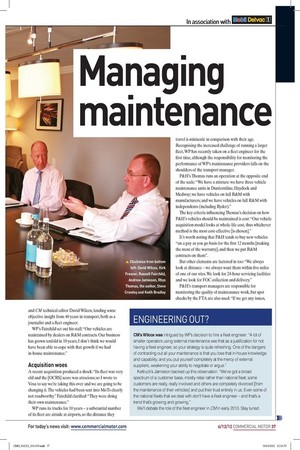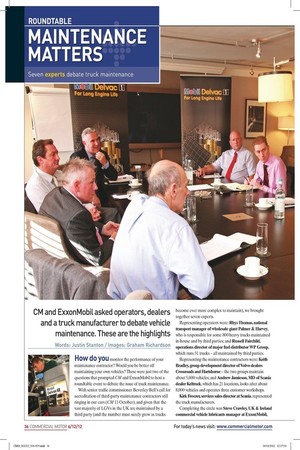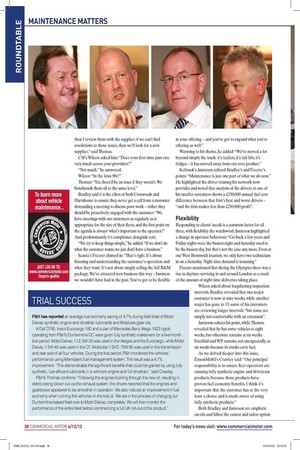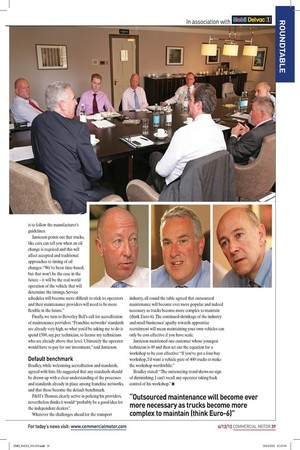Managing maintenance
Page 29

Page 28

Page 30

Page 31

If you've noticed an error in this article please click here to report it so we can fix it.
CM and ExxonMobil asked operators, dealers and a truck manufacturer to debate vehicle maintenance. These are the highlights Worus: Justin btanton / Images: Graham Richaruson How do you monitor the performance of your maintenance contractor? Would you be better off maintaining your own vehicles? These were just two of the questions that prompted CM and ExxonMobil to host a roundtable event to debate the issue of truck maintenance.
With senior traffic commissioner Beverley Bell's call for accreditation of third-party maintenance contractors still ringing in our ears (CM 11 October), and given that the vast majority of LGVs in the UK are maintained by a third party (and the number must surely grow as trucks become ever more complex to maintain), we brought together seven experts.
Representing operators were: Rhys Thomas, national transport manager of wholesale giant Palmer & Harvey, who is responsible for some 800 heavy trucks maintained in-house and by third parties; and Russell Fairchild, operations director of major fuel distributor WP Group, which runs 51 trucks — all maintained by third parties.
Representing the maintenance contractors were: Keith Bradley, group development director of Volvo dealers Crossroads and Hartshorne — the two groups maintain about 5,000 vehicles; and Andrew Jamieson, MD of Scania dealer Keltruck, which has 21 locations, looks after about 8,000 vehicles and operates three customer workshops.
Kirk Freezer, services sales director at Scania, represented the truck manufacturers.
Completing the circle was Steve Crawley, UK & Ireland commercial vehicle lubricants manager at ExxonMobil, and CM technical editor David Wilcox, lending some objective insight from 40 years in transport, both as a journalist and a fleet engineer.
WP's Fairchild set out his stall: "Our vehicles are maintained by dealers on R&M contracts. Our business has grown tenfold in 10 years; I don't think we would have been able to cope with that growth if we had in-house maintenance."
Acquisition woes A recent acquisition produced a shock: "Its fleet was very old and the [OCRS] score was atrocious; so I wrote to Vosa to say we're taking this over and we are going to be changing it. The vehicles had been sent into MoTs clearly not roadworthy." Fairchild clarified: "They were doing their own maintenance."
WP runs its trucks for 10 years — a substantial number of its fleet are airside at airports, so the distance they travel is miniscule in comparison with their age. Recognising the increased challenge of running a larger fleet,WP has recently taken on a fleet engineer for the first time, although the responsibility for monitoring the performance of WP's maintenance providers falls on the shoulders of the transport manager.
P&H's Thomas runs an operation at the opposite end of the scale: "We have a mixture: we have three vehicle maintenance units in Dunfermline, Haydock and Medway; we have vehicles on full R&M with manufacturers; and we have vehicles on full R&M with independents (including Ryder)."
The key criteria influencing Thomas's decision on how P&H's vehicles should be maintained is cost: "Our vehicle acquisition model looks at whole-life cost, thus whichever method is the most cost-effective [is chosen]."
It's worth noting that P&H tends to buy new vehicles "on a pay as you go basis for the first 12 months [making the most of the warranty], and then we put R&M contracts on them".
But other elements are factored in too: "We always look at distance — we always want them within five miles of one of our sites. We look for 24-hour servicing facilities and we look for FOC collection and delivery."
P&H's transport managers are responsible for monitoring the quality of maintenance work, but spot checks by the FTA are also used. "If we get any issues, then I review them with the supplier; if we can't find resolutions to those issues, then we'll look for a new supplier," said Thomas.
CM's Wilcox asked him: "Does your first-time pass rate vary much across your providers?"
"Not much," he answered.
Wilcox: "In the lows 90s?"
Thomas: "Yes, there'd be an issue if they weren't. We benchmark them all to the same level."
Bradley said it is the ethos of both Crossroads and Hartshorne to ensure they never get a call from a customer demanding a meeting to discuss poor work — rather they should be proactively engaged with the customer: "We have meetings with our customers as regularly as is appropriate for the size of their fleets, and the first point on the agenda is always 'what's important to the operator?' And predominantly it's compliance alongside cost.
"We try to keep things simple," he added. "If we don't do what the customer wants, we just don't have a business."
Scania's Freezer chimed in: "That's right. It's about listening and understanding the customer's operation and what they want. It's not about simply selling the full R&M package. We've attracted new business this way — business we wouldn't have had in the past. You've got to be flexible in your offering — and you've got to expand what you're offering as well."
Warming to his theme, he added: "We've moved a lot beyond simply the truck: it's trailers, it's tail-lifts, it's fridges — it has moved away from our core product."
Keltruck's Jamieson echoed Bradley's and Freezer's points: "Maintenance is just one part of what we do now." He highlighted the driver training his network now provides and noted that analysis of the drivers at one of his smaller customers shows a £250,000 annual fuel cost difference between that firm's best and worst drivers — "and the firm makes less than £250,000 profit".
Flexibility Responding to clients' needs is a common factor for all three, with flexibility the watchword. Jamieson highlighted a change in operator behaviour: "Go back a few years and Friday nights were the busiest night and Saturday used to be the busiest day, but that's not the case any more. Even at our West Bromwich location, we only have two technicians in on a Saturday. Night-time demand is lessening."
Freezer mentioned that during the Olympics there was a rise in daytime servicing in and around London as a result of the amount of night-time deliveries taking place.
Wilcox asked about lengthening inspection intervals. Bradley revealed that one major customer is now at nine weeks, while another major has gone to 13; some of his customers are reviewing longer intervals, "but some are simply not comfortable with an extension".
Jamieson echoes his point, while Thomas revealed that he has some vehicles at eight weeks, but otherwise remains at six weeks. Fairchild said WP remains, not unexpectedly, at six weeks because its trucks carry fuel.
As we delved deeper into this issue, ExxonMobil's Crawley said: "Our principal responsibility is to ensure fleet operators are running fully synthetic engine and drivetrain products, because those products have proven fuel economy benefits. I think it's important that the customer has at the very least a choice and is made aware of using fully synthetic products."
Both Bradley and Jamieson are emphatic on oils and tubes: the easiest and safest option is to follow the manufacturer's guidelines.
Jamieson points out that trucks, like cars, can tell you when an oil change is required and this will affect accepted and traditional approaches to timing of oil changes: "We've been time-based, but that won't be the case in the future — it will be the real-world operation of the vehicle that will determine the timings. Service schedules will become more difficult to stick to; operators and their maintenance providers will need to be more flexible in the future."
Finally, we turn to Beverley Bell's call for accreditation of maintenance providers. "Franchise networks' standards are already very high, so what you'd be asking me to do is spend £500, say, per technician, to license my technicians who are already above that level. Ultimately the operator would have to pay for our investment," said Jamieson.
Default benchmark Bradley, while welcoming accreditation and standards, agreed with him He suggested that any standards should be drawn up with a clear understanding of the processes and standards already in place among franchise networks, and that these become the default benchmark.
P&H's Thomas, clearly active in policing his providers, nevertheless thinks it would "probably be a good idea for the independent dealers".
Whatever the challenges ahead for the transport industry, all round the table agreed that outsourced maintenance will become ever more popular and indeed necessary as trucks become more complex to maintain (think Euro-6). The continued shrinkage of the industry and small businesses' apathy towards apprentice recruitment will mean maintaining your own vehicles can only be cost-effective if you have scale.
Jamieson mentioned one customer whose youngest technician is 49 and then set out the equation for a workshop to be cost-effective: "If you've got a four-bay workshop, I'd want a vehicle parc of 400 trucks to make the workshop worthwhile."
Bradley stated: "The outsourcing trend shows no sign of diminishing; I can't recall any operator taking back control of his workshop." • ENGINEERING OUT?
CM's Wilcox was intrigued by WP's decision to hire a fleet engineer: "A lot of smaller operators using external maintenance see that as a justification for not having a fleet engineer, so your strategy is quite refreshing. One of the dangers of contracting out all your maintenance is that you lose that in-house knowledge and capability, and you put yourself completely at the mercy of external suppliers, weakening your ability to negotiate or argue."
Keltruck's Jamieson backed up this observation: "We've got abroad spectrum of a customer base, mostly retail rather than national fleet; some customers are really, really involved and others are completely divorced [from the maintenance of their vehicles] and put their trust entirely in us. Even some of the national fleets that we deal with don't have a fleet engineer — and that's a trend that's growing and growing."
We'll debate the role of the fleet engineer in CM in early 2013. Stay tuned.
TRIAL SUCCESS P&H has reported an average fuel economy saying of 4.7% during field trials of Mobil Delyac synthetic engine and driyetrain lubricants and Mobilube gear oils.
A Daf CF85, lveco Eurocargo 180 and a pair of Mercedes-Benz Atego 1823 rigids operating from P&H's Dunfermline DC were given fully synthetic makeovers for a five-month trial period. Mobil Delyac 1 LE 5W-30 was used in the Ategos and the Eurocargo, while Mobil Delyac 1 5W-40 was used in the CF. Mobilube 1 SHC 75W-90 was used in the transmission and rear axle of all four vehicles. During the trial period, P&H monitored the vehicles' performance using Merridale's fuel management system. The result was a 4.7% improvement. "This demonstrates the significant benefits that could be gained by using fully synthetic, fuel-efficient lubricants in a vehicle's engine and full driyetrain," said Crawley.
P&H's Thomas confirms: "Following the engines flushing through the new oil, resulting in debris being blown out via the exhaust system, the drivers reported that the engines and gearboxes appeared to be smoother in operation. We also noticed an improvement in fuel economy when running the vehicles on the trial oil. We are in the process of changing our Dunfermline-based fleet over to Mobil Delyac completely. We will then monitor the performance of the entire fleet before commencing a full UK roll-out of the product."








































